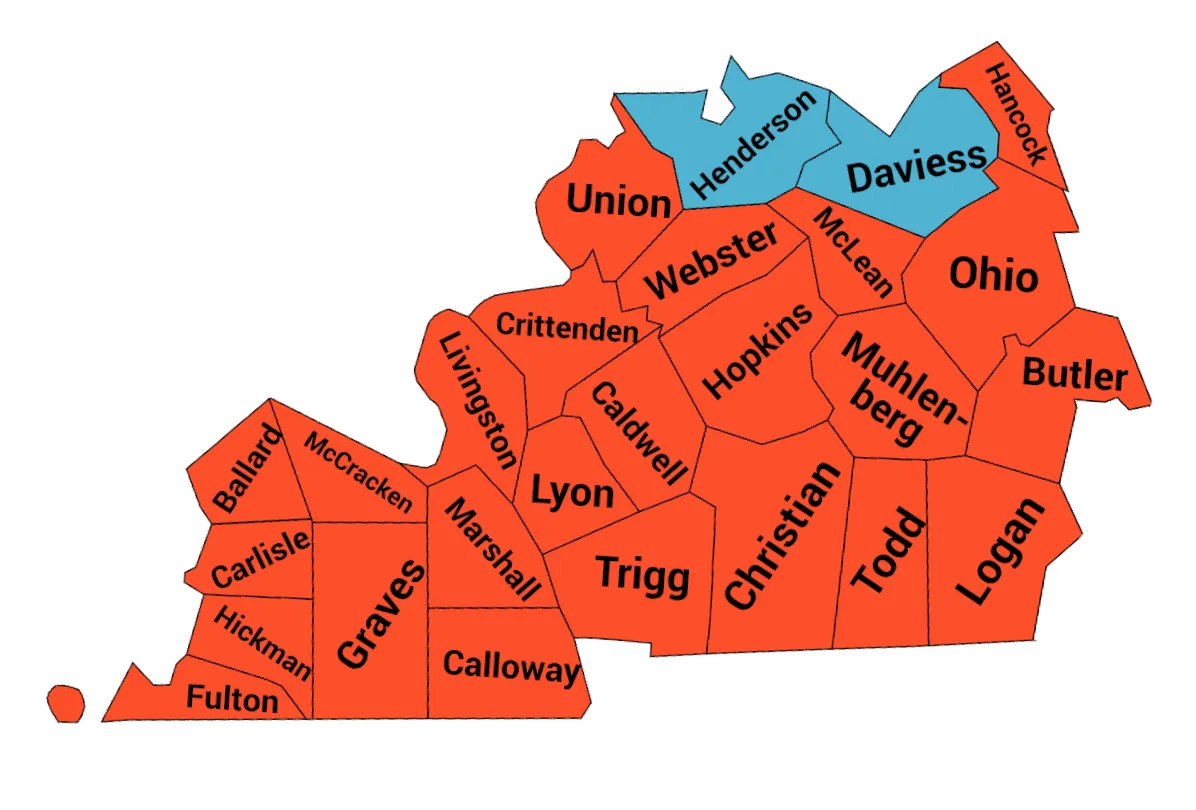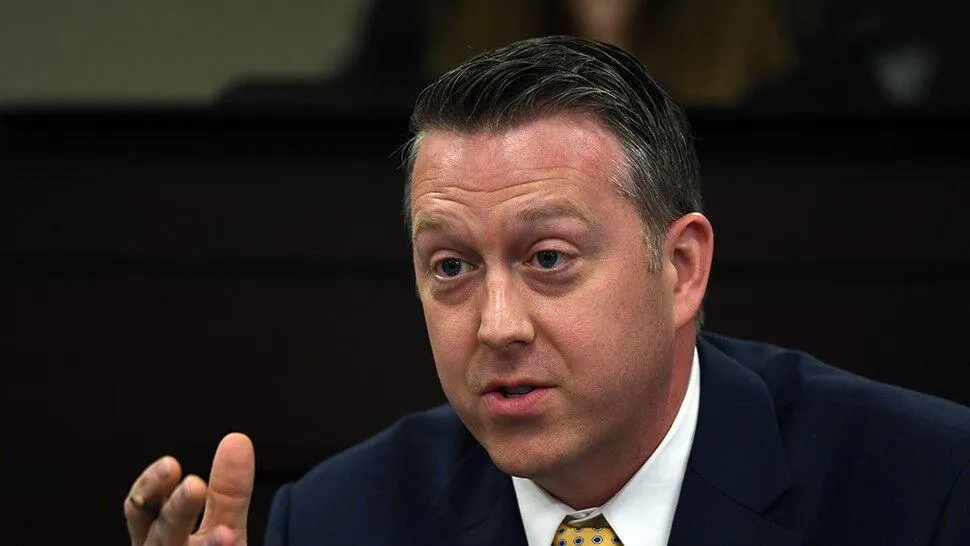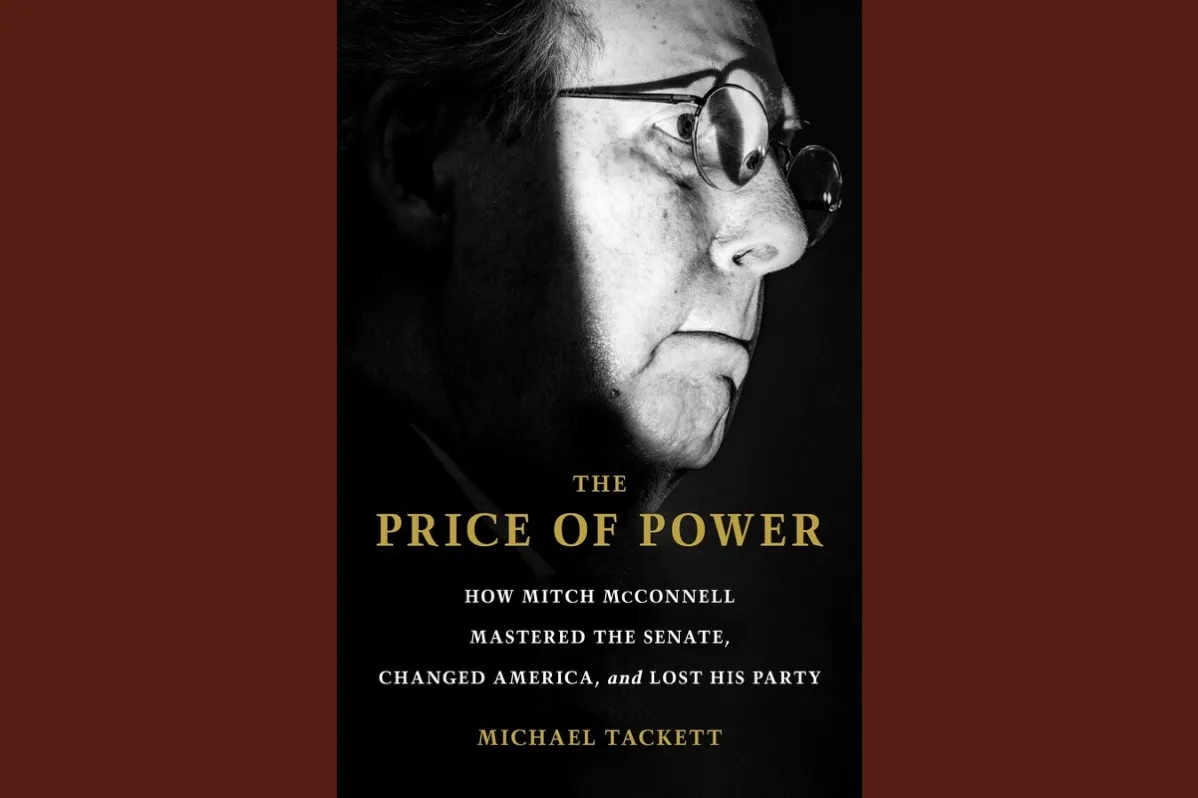In his campaign kickoff speech at the storied Fancy Farm picnic in Graves County, Gov. Andy Beshear touted job-generating “record economic development” in western Kentucky on his watch. He also cited “hundreds of million dollars” that have flowed into the region via the Western Kentucky Tornado Relief Fund, which he started.
(More than “150,000 individuals and organizations have contributed to the fund, raising millions of dollars to assist in long term recovery,” says the fund’s website.)
Beshear, a moderate Democrat, won the election by a reasonably comfortable five percentage points. But he lost Graves and the state’s 13 other westernmost counties to Republican Attorney Gen. Daniel Cameron, his hard-right, Trump-endorsed MAGA challenger.
“Andy Beshear did so much for this area and look how he was repaid,” said Murray State University historian Brian Clardy, adding that the governor repeatedly visited Mayfield and other communities ravaged by the especially violent tornado system that spun a region-wide path of death and destruction.
“Shame on WKY”
Clardy is one of many western Kentucky Democrats who are frustrated that their tornado-ravaged region went for Cameron.
Murray is the seat of Calloway County, one of 14 counties west of Henderson County that rejected a second Beshear term. Besides Henderson, Beshear carried only adjacent Daviess County. He also pocketed Warren County, but it is considered more south-central than western Kentucky.
Yet, Beshear increased his vote percentage from 2019 in all but one of the deep western Kentucky counties that eluded him again. That fact might temper some Democrats’ disappointment. In addition, the governor apparently carried Murray and two more county seats: Paducah, in McCracken County; and Mayfield, in Graves County.
Mayfield was one of the communities hardest hit by the powerful EF 4 tornado, which destroyed scores of homes and wiped out most of the downtown business district, the courthouse, and city hall.
Tom Waldrop of Mayfield, who chairs the county Democratic Executive Committee, said Beshear was in town “easily within 12 hours” of the tornado strike. “He was at the candle factory when they still didn’t know how many died in the factory.” Nine people lost their lives after the tornado collapsed the building's roof. The death toll reached 24 in Mayfield and Graves County.
Other Democrats share Clardy’s disgust that so many of their fellow western Kentuckians turned thumbs-down on Beshear again.
Some are venting on social media. Here's a sampling from Facebook:
—“Shame on WKY...Gov Andy Beshear’s reelection campaign saw a boost in flooded Eastern counties but not in tornado-struck Western Kentucky....We REALLY let Andy down – shame on us!”
— “NO EXCUSE – ALL THE DAMN SELFIES – I am furious…shame!! Grrrrrrrr”
— “I was very surprised and disappointed Andy did not get more support from counties affected by the tornadoes. He was there for them, and will be again if needed.”
— “I would have thought the counties affected by the tornadoes would have been more supportive. At least one."
— “I think a lot of the ‘church people’ are still mad over Andy’s actions during the pandemic. Even though he was trying to save lives.”
‘D,’ the mark of doom
By “church people” the poster meant the region’s many conservative white evangelicals of the “You can’t be a Christian and a Democrat” persuasion. They dote on Donald Trump while demonizing Democrats as “woke,” gun-grabbing, hell-bound baby killers.
“Regardless of what a Democrat does insofar as relief, job creation, projecting a positive image – no matter what that person does, as long as they have a ‘D’ behind their name, most rural voters will vote Republican even if it means voting against their own self-interest,” Clardy said.
Time was, an “R” doomed candidates to defeat in western Kentucky, especially in the Jackson Purchase, the eight counties sandwiched between the Tennessee and Mississippi Rivers. Even so, most old-guard white Purchase Democrats were conservatives. Like their Confederate forebears, they were more akin to southern Democrats than to Democrats elsewhere in Kentucky.
During the Civil War, the Purchase, dubbed “the South Carolina of Kentucky,” was the state’s only Confederate-majority region. Hatred for the Yankee anti-slavery “Black Republican” party of Abraham Lincoln persisted for a century after the nation’s most lethal conflict.
In 1968, segregationist former Alabama Gov. George Wallace, the symbol of Southern resistance to integration, won Fulton and Hickman counties in the Purchase.
Meanwhile, the national Democrats’ embrace of landmark federal civil rights legislation in the mid-60s led the white Democratic “Solid South” to start abandoning the party of their white supremacist ancestors. The two big parties were shifting; the GOP of “Lincoln and Liberty” and civil rights activism was fast becoming the party of “states’ rights,” the old Southern Democrats’ code words for slavery before the Civil War and, afterwards, Jim Crow segregation and Black voter suppression.
It took a few decades longer for border state Kentucky to embrace the GOP.
Deeply conservative white evangelical Christianity is the dominant faith in much of rural Kentucky, especially in the western section of the state. That faith, according to the Episcopalian Clardy, is another big factor in the region’s swerve toward the Republicans.
‘God’s Own Party’
The GOP has become largely the party of white, conservative Christendom, a shift that began before the advent of Donald Trump.
“We have had small-scale theocracies in North America before – in Puritan New England and later in Mormon Utah,” wrote the late conservative pundit Kevin Phillips in a 2006 Washington Post article titled “How the GOP Became God’s Own Party.”
Warned Phillips: “Today, a leading power such as the United States approaches theocracy when it meets the conditions currently on display: an elected leader who believes himself to speak for the Almighty, a ruling political party that represents religious true believers, the certainty of many Republican voters that government should be guided by religion and, on top of it all, a White House that adopts agendas seemingly animated by biblical worldviews.”
Conservative Republican George W. Bush was president when Phillips’ article was published. But the current GOP seems to be tacking beyond Christian conservatism toward Christian nationalism, if it’s not already there. “A Christian nationalist is someone who, like [the new House Speaker Mike] Johnson, believes the United States is a Christian nation and does not believe in what Johnson dismisses as the ‘so-called ‘separation of church and state,’” Kate Cohen recently wrote in The Washington Post.
“Christian nationalism is a rigid ideology that focuses on a literal interpretation of scripture, cherry-picking the teachings of Paul and fashioning it into a theology that stigmatizes ‘others’ – racial minorities, women, immigrants, LGBTQ – and turns a blind eye toward issues of racism, poverty and social justice,” Clardy said.
Cameron, who is Black, had almost no Black support statewide, but especially in Louisville and Lexington. Hence, he counted on rural whites to carry him to victory and pandered to prejudice accordingly, according to Clardy, who is also Black. “He knew exactly which buttons to push.”
A Kentucky delegate to Democratic national conventions that nominated Barack Obama and Hillary Clinton for president, Clardy wishes he could be more optimistic about his party’s future in Kentucky. “Even with Beshear’s win, we lost everything down ballot.”
He figures Trump, if he’s the GOP nominee, will romp anew in Kentucky next year. With Trump on the ballot again, Clardy doubts the Democrats would dent the GOP supermajorities in the state House and Senate in 2024.
Meanwhile, the professor is happy that Beshear won. “Thank goodness for that,” he said. But he added that the Cameron sweep in farthest western Kentucky — and his success in other mostly white rural areas — “shows what those people are thinking.”
One veteran Democratic activist said Beshear didn’t lose western Kentucky, which is about as Republican Red as the Bluegrass State gets, because “he never had it.”
Echoing the ancient aphorism “many a truth is spoken in jest,” the party pro declared, “Even if Beshear had gotten in front of those tornadoes and stopped them, most western Kentuckians still wouldn’t have voted for him.”
--30--
Comments








